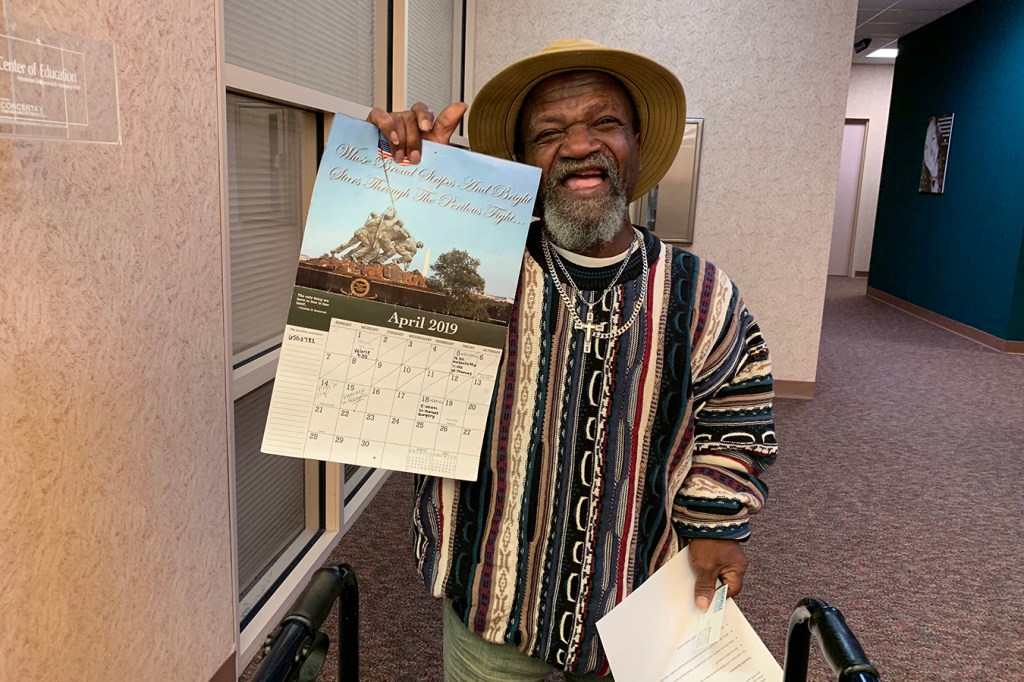Modern medicine often views the mind and body on separate tracks, both in terms of treatment and health insurance reimbursement. But patients with psychological disorders can have a hard time managing their physical health.
So some Medicaid programs, which provide health coverage for people with low incomes, have tried to coordinate patients’ physical and mental health care.
The goal is to save state and federal governments money while improving the health of patients like John Poynter of Clarksville, Tenn.
Poynter has more health problems than he can recall. “Memory is one of them,” he said, with a laugh that punctuates the end of nearly every sentence.
He is recovering from his second hip replacement, related to his dwarfism. Poynter gets around with the help of a walker, which is covered in keychains from places he has been. He also has diabetes and struggles to manage his blood sugar.
But most of his challenges, he said, revolve around one thing: alcoholism.
“I stayed so drunk, I didn’t know what health was,” Poynter said, with his trademark chuckle.
Nevertheless, he often used Tennessee’s health system back when he was drinking heavily. Whether because of a car wreck or a glucose spike, he regularly visited hospital emergency rooms, where every bit of health care is more expensive.
The Case For Coordination Of Mind-Body Care
Tennessee’s Medicaid program, known as TennCare, has more than 100,000 patients in circumstances similar to Poynter’s. They’ve had a psychiatric inpatient or stabilization episode, along with an official mental health diagnosis — depression or bipolar disorder, maybe, or, as in Poynter’s case, alcohol addiction.
Their mental or behavioral health condition might be manageable with medication and/or counseling, but without that treatment, their psychological condition is holding back their physical health — or vice versa.
“They’re high-use patients. They’re not necessarily high-need patients,” said Dr. Roger Kathol, a psychiatrist and internist with Cartesian Solutions outside Minneapolis. He consults with hospitals and health plans working to integrate mental and physical care.
As studies have shown, these dual-track patients end up consuming way more care than they would otherwise need.
“So, essentially, they don’t get better either behaviorally or medically,” Kathol said, “because their untreated behavioral health illness continues to prevent them from following through on the medical recommendations.”
For example, a patient’s high blood pressure will never be controlled if an active addiction keeps them from taking hypertension medication.
Coordinating mental and physical health care presents business challenges because, typically, two different entities pay the bills, even within Medicaid programs. That’s why TennCare started offering incentives to reward teamwork.
Paying For Performance
TennCare’s interdisciplinary program, known as Tennessee Health Link, was launched in December 2016. The first year, the agency paid nearly $7 million in bonuses to mental health providers who guide patients in care related to their physical health.
TennCare has a five-star metric to gauge a care coordinator’s performance, measuring each patient’s inpatient hospital and psychiatric admissions as well as visits to emergency rooms. Providers are eligible for up to 25% of what’s calculated as the savings to the Medicaid program.
Studies show this sort of coordination and teamwork could end up saving TennCare hundreds of dollars per year, per patient. And a 2018 study from consulting firm Milliman found most of the savings are on the medical side — not from trimming mental health treatment.
In experiments around the U.S. among varied patient populations, savings from care coordination at times have been elusive. A TennCare spokesperson said it’s too early to tell whether its program is either improving health or saving money. As a start, though, TennCare reports these dual-track patients are visiting the ER less often.
While there’s a strong financial case for coordination, it could also save lives. Studies show patients who have both a chronic physical condition and a mental illness tend to die young.
“They’re not dying from behavioral health problems,” noted Mandi Ryan, director of health care innovation at Centerstone, a multistate mental health provider. “They’re dying from a lack of preventive care on the medical side. So that’s where we really started to focus on how can we look at this whole person.”
But refocusing, she said, has required changing the way physicians practice medicine, and changing what’s expected of case managers, turning them into wellness coaches.
“We don’t really get taught about hypertension and hyperlipidemia,” said Valerie Klein, a care coordinator who studied psychology in school and is now an integrated care manager at Centerstone’s office in Clarksville, Tenn.
“But when we look at the big picture,” Klein said, “we realize that if we’re helping them improve their physical health, even if it’s just making sure they got to their appointments, then we’re helping them improve their emotional health as well.”
Klein now helps keep Poynter on track with his treatment. Her name appears regularly on a wall calendar where he writes down his appointments.
Poynter calls Klein his “backbone.” She helped schedule his recent hip surgery and knows the list of medications he takes better than he does.
Klein acknowledges it’s a concept that now seems like an obvious improvement over the way behavioral health patients have been handled in the past.
“I don’t know why we didn’t ever realize that looking at the whole person made a difference,” she said.
This story is part of a partnership that includes Nashville Public Radio, NPR and Kaiser Health News.







